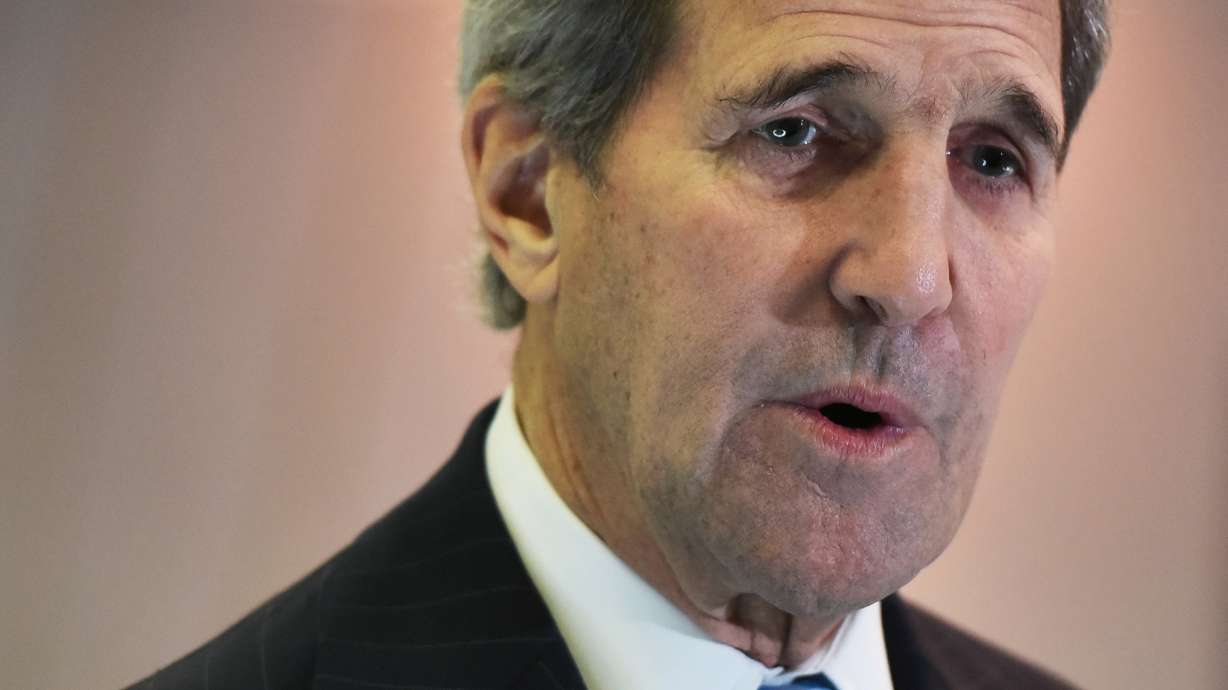Estimated read time: 4-5 minutes
This archived news story is available only for your personal, non-commercial use. Information in the story may be outdated or superseded by additional information. Reading or replaying the story in its archived form does not constitute a republication of the story.
MOSCOW (AP) — U.S. Secretary of State John Kerry is in Russia to try and narrow gaps with Russian leaders over a political transition to end Syria's civil war and restore stability in eastern Ukraine.
After spending last week at climate talks outside the French capital, Kerry arrived early Tuesday in Moscow, where he will meet Russian President Vladimir Putin and Foreign Minister Sergey Lavrov.
Before departing Paris, Kerry attended a French-hosted foreign ministers meeting to compare notes on the results of a conference of Syrian opposition figures held last week in Saudi Arabia that are key to the peace effort. He also met separately with the foreign ministers of Saudi Arabia, Jordan and Qatar.
The trip is Kerry's second to Russia this year — he met with Putin in the Black Sea resort of Sochi in May — but his first since frosty relations over Ukraine were exacerbated by Moscow's intervention in Syria in late September. President Barack Obama has seen Putin briefly twice since then at international summits in Turkey and France.
A U.S. diplomat in Paris, who demanded anonymity to discuss the talks, said a meeting in Geneva on Friday between Russian and American diplomats on Syria was aimed mainly at clearing up Russian "grievances" ahead of Tuesday's Moscow meeting.
A statement issued by the Russian Foreign Ministry aired some of those grievances, saying that Moscow "will continue to seek a revision of the U.S. administration policy based on dividing terrorists into a 'bad' and 'good' ones" and complaining that the U.S. was unwilling to engage in "full-fledged coordination" between the two powers' militaries while both are conducting airstrikes in Syria.
Russia says its airstrikes since late September have targeted the Islamic State, but Western governments claim mostly moderate rebels are being hit and that Moscow is primarily concerned with shoring up Syrian President Bashar Assad.
Assad's future and his potential role in the political transition will be prime topics of Kerry's conversation with Putin and Lavrov, according to U.S. officials who say the results of the meetings will determine whether or not a new international diplomatic conference on Syria will go ahead as planned at the United Nations on Friday. Russia has consistently said Assad's future is for the Syrian people to decide, while the U.S. and many of its allies insist that he go, although they have softened their stance somewhat to allow Assad to play some kind of role in the transition.
Syrian opposition groups, however, demand that Assad leave at the start of the process — a point they reiterated at last week's meeting in Saudi Arabia — which is supposed to begin in early January, once the opposition groups have settled on a delegation to negotiate with the government. At the same time, Russia objects to the inclusion in the opposition of groups it considers to be terrorist organizations that would not be eligible for a cease-fire planned to take effect simultaneously with, or shortly after, the start of negotiations.
State Department spokesman John Kirby in Washington rejected Russian claims of preconditions that must be reached for the next round of international Syria talks to take place in New York on Friday. "There are no preconditions to having this meeting, or to having these discussions," Kirby said.
One senior official traveling with Kerry said he would be exploring ways to bridge gaps on both the political transition and the cease-fire as well as making the point that Russia's military operations in Syria need to focus on the Islamic State. The official, who was not authorized to speak publicly about Kerry's meetings and spoke on condition of anonymity, said that despite previous similar calls, a lot of Russian airstrikes continue to go toward Syrian rebels.
The official said Kerry would also be inquiring about recent comments from Putin and Russian military officers suggesting that Moscow is supplying the Free Syrian Army, which is opposed to Assad, with air support and weapons.
The U.S. and Russia are also at odds over Ukraine, where the U.S. says Russia's continued support for separatists in the east is destabilizing and prevents any end to hostilities.
The U.S. has been pressing its European allies to continue applying sanctions on Russia because of its annexation last year of Crimea and its support for the separatists.
In Moscow, Kerry will ask for Russia's full implementation of a February cease-fire in exchange for sanctions relief. That deal called for the removal of heavy weaponry from front lines, a Russian troop withdrawal, the release of detainees and full access for international monitors. That cease-fire has become increasingly strained.
The official also rejected suggestions that the U.S. might be willing to ease off on Ukraine if Russia alters its positions on Syria.
"We are not playing 'Let's Make a Deal' here," the official said. "We are not trading Ukraine for Syria."
___
Associated Press writers Bradley Klapper in Washington, Jamey Keaten in Paris and Vladimir Isachenkov in Moscow contributed to this report.
Copyright © The Associated Press. All rights reserved. This material may not be published, broadcast, rewritten or redistributed.









